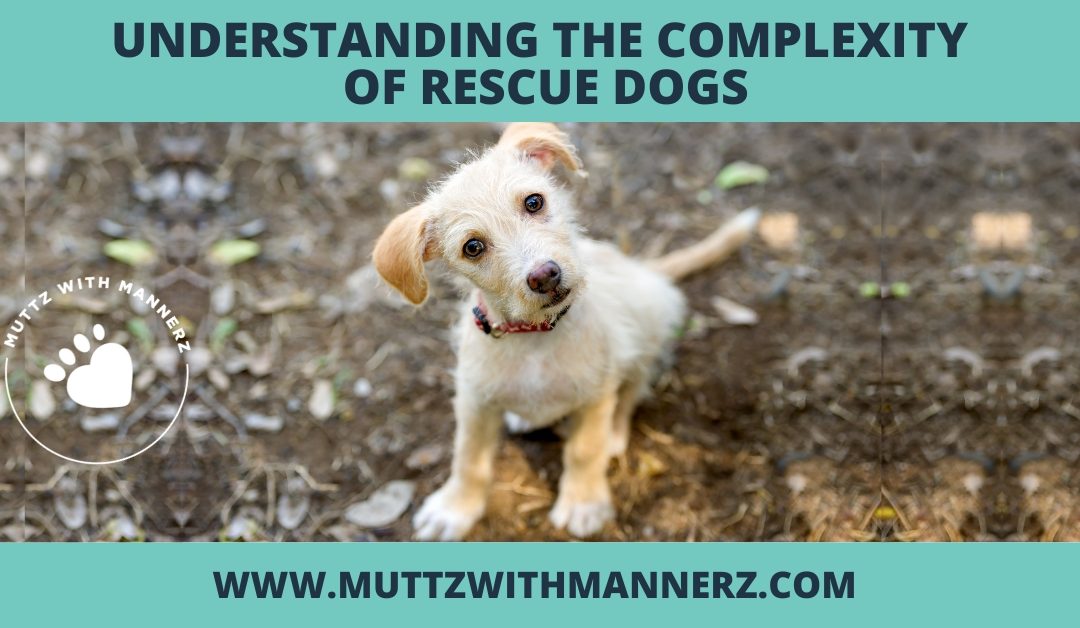Rescue dogs can make wonderful pets, but they often face unique challenges that can make the adoption process more complex. These challenges usually stem from the fact that rescue dogs have had difficult situations impacting their life such as rehoming due to the death of a pet parent or a change in family situation, or they are a puppy mill or street dog before being taken in by a shelter or rescue organization. As a result of these challenges, they may require more love, patience, and training than a typical pet.
Today, we will explore the complexity of rescuing a dog and provide suggestions for helping them become happy, healthy members of your family. Let’s dive in!
The First Step – Finding the right dog to match your needs
 A rescue organization can help. Do your homework and research the local rescue organizations to learn more about them and the dogs they accept into their programs. You want to find a rescue you can trust. A reputable rescue will be registered as a not-for-profit or charitable organization. They should have a board of directors and an established group of volunteers. A good all-breed rescue will have a wide variety of dogs available, both young and seniors.
A rescue organization can help. Do your homework and research the local rescue organizations to learn more about them and the dogs they accept into their programs. You want to find a rescue you can trust. A reputable rescue will be registered as a not-for-profit or charitable organization. They should have a board of directors and an established group of volunteers. A good all-breed rescue will have a wide variety of dogs available, both young and seniors.
Common Challenges Your Rescue May Experience
Here are some challenges that your rescue may experience and how you can help.
Fear and Anxiety – Many rescue dogs may have been subject to abuse or neglect in their past, leading to fear and anxiety in new or unfamiliar situations. This can make socialization and training challenging, as they may be hesitant to interact with other dogs or people. Patience and positive reinforcement techniques such as treats or praise, can help build trust and reduce anxiety.
Lack of Socialization – Rescue dogs can have experienced limited social exposure and require proper socialization to help them develop healthy social skills. Start with small interactions, get them used to their home environment and family members first. When they are comfortable, you can introduce walks with other dogs or short play sessions, and gradually meet new people. Introduce new things to them at a pace they can handle and avoid overwhelming them.
Higher Training Needs – Rescue dogs often require additional training to help them assimilate into their new environment. Basic obedience training (especially recall!) can help improve their behavior and establish a bond between the dog and their new family. Each rescue is different, so find a trainer you trust that can help you build their foundation, confidence, and the necessary skills for their new environment.
 Consistency is key in the training of rescue dogs. Establishing a routine, using consistent commands, and addressing behavioral issues immediately can help reinforce positive behavior and reduce negative behavior.
Consistency is key in the training of rescue dogs. Establishing a routine, using consistent commands, and addressing behavioral issues immediately can help reinforce positive behavior and reduce negative behavior.
By understanding the socialization and training challenges and also potential behavioural issues associated with rescue dogs, owners can provide them with the support and guidance necessary to become well-adjusted and confident pets.
Overcoming Behavioural Issues
Rescue dogs often come with a lot of emotional baggage from their past experiences, which can manifest as challenging behaviors in their new homes. As a new owner, it is important to be aware of these behavioral issues and take the necessary steps to address them.
Separation Anxiety – Many rescue dogs have a fear of being left alone, which can result in separation anxiety. They may become destructive when left alone or exhibit anxious behaviors such as pacing or excessive barking. Gradual desensitization, using positive reinforcement, and crate training, can all help alleviate separation anxiety.
Aggression – Some rescue dogs may have a history of abuse or neglect, leading to aggressive behaviors towards people, other dogs, or even objects. Aggression can be dangerous and should be addressed immediately. Consultation with a professional dog trainer or behaviorist is recommended to address these issues.
Fear and Anxiety – As mentioned in the previous section, rescue dogs may come with fear and anxiety issues which can be challenging to overcome. It may take time and patience to build trust and confidence in these dogs. Using positive reinforcement techniques, gradual exposure, and lots of love and attention can help calm their fears.
House Training – Some rescue dogs may not be house-trained, causing accidents in the house. Consistency, boundaries, a structured routine, and positive reinforcement can help with successful house training.
Patience and Persistence are Key to Building Trust
Rescue dogs may come with a variety of challenges and difficulties, but with patience and persistence, you can help them adjust to their new life. It may take time for them to trust you and feel comfortable in their new environment.
It is important to remember that rescue dogs come from various backgrounds and experiences, and their behavior and needs may differ. However, with consistent love, care, and training, they can thrive and become loyal and loving family members.
Professional Help is Available
 Professional trainers and behaviorists have the experience, knowledge, and resources to help your rescue dog overcome their challenges and become a well-behaved and happy companion.
Professional trainers and behaviorists have the experience, knowledge, and resources to help your rescue dog overcome their challenges and become a well-behaved and happy companion.
Working with a professional can also be beneficial for the owner, providing guidance and support as they navigate the challenges of rescue dog ownership. They can offer advice on training techniques, behavioral modification, and even tips on caring for dogs with specific needs.
Adopting a rescue dog poses several challenges, but it can also be a fulfilling and rewarding experience. It is important to understand the potential behavior issues that may arise and be prepared to provide the necessary support and training to help your dog overcome them.
Remember to exercise patience, consistency, and kindness throughout the process. Seek out professional help when needed, and always prioritize the well-being of your furry friend. With dedication and commitment, you can provide your rescue dog with a loving and happy forever home.
For more information listen to our recent Podcast Episode The Complexity of Rescue Dogs with Karen Baxter https://www.muttzwithmannerz.com/podcast/episode-025.
At Muttz with Mannerz™, we also offer classes for you and your rescue to build foundational skills visit https://muttzwithmannerz.com/classes for more information.

